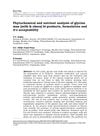 13 citations,
January 2022 in “Advances in Dermatology and Allergology”
13 citations,
January 2022 in “Advances in Dermatology and Allergology” Alopecia areata may be linked to imbalanced gut bacteria.
 53 citations,
April 2021 in “Cell Host & Microbe”
53 citations,
April 2021 in “Cell Host & Microbe” Skin bacteria, specifically Staphylococcus aureus, help in wound healing and hair growth by using IL-1β signaling. Using antibiotics on skin wounds can slow down this natural healing process.
 December 2024 in “Microorganisms”
December 2024 in “Microorganisms” Microbiota changes in deer antler velvet aid in wound healing and tissue regeneration.
 6 citations,
December 2023 in “Lancet. Infectious diseases/The Lancet. Infectious diseases”
6 citations,
December 2023 in “Lancet. Infectious diseases/The Lancet. Infectious diseases” SIM01 significantly reduced post-COVID symptoms and is safe.

Lactobacillus plantarum L30 can help repair hair follicles and improve hair growth in alopecia.
 9 citations,
April 2023 in “Frontiers in immunology”
9 citations,
April 2023 in “Frontiers in immunology” New technologies help us better understand how skin microbes affect skin diseases.
 April 2024 in “Scientific reports (Nature Publishing Group)”
April 2024 in “Scientific reports (Nature Publishing Group)” Rosemary and neem extract may be an effective natural treatment for dandruff and hair loss.
 June 2024 in “Skin Research and Technology”
June 2024 in “Skin Research and Technology” Red fluorescence in AGA scalps is linked to different microbes.
 September 2023 in “Mağallaẗ baġdād li-l-ʿulūm”
September 2023 in “Mağallaẗ baġdād li-l-ʿulūm” Microbial communities in Duku plant roots vary between wet and dry habitats, affecting plant health.
2 citations,
February 2024 in “International journal of molecular sciences” Gut health affects skin diseases, and probiotics might help.
 8 citations,
October 2022 in “Cold Spring Harbor perspectives in biology”
8 citations,
October 2022 in “Cold Spring Harbor perspectives in biology” The document concludes that better understanding the wound microbiome can improve chronic wound care by preserving helpful bacteria and targeting harmful ones.
 April 2024 in “Frontiers in pharmacology”
April 2024 in “Frontiers in pharmacology” Cynoglossum amabile has medicinal potential but poses safety concerns due to liver toxicity.
 1 citations,
May 2022 in “International Journal of Health Sciences (IJHS) (En línea)”
1 citations,
May 2022 in “International Journal of Health Sciences (IJHS) (En línea)” Soybean milk and okara are nutritious, have health benefits, and make tasty, long-lasting food products.
March 2024 in “Nutrients” Alopecia Areata is linked to specific gut bacteria and metabolites, indicating a complex gut microbiome.
 1 citations,
July 2022 in “PLOS ONE”
1 citations,
July 2022 in “PLOS ONE” The study concluded that people with Lichen Planopilaris have a more diverse scalp bacteria and different metabolic pathways compared to healthy individuals.
 1 citations,
September 2010 in “The journal of investigative dermatology/Journal of investigative dermatology”
1 citations,
September 2010 in “The journal of investigative dermatology/Journal of investigative dermatology” The meeting highlighted major advances in skin research, including new findings on skin microbes, genetic links to skin diseases, and improved treatments for various conditions.
 26 citations,
May 2019 in “PLOS ONE”
26 citations,
May 2019 in “PLOS ONE” Hair loss patients have different microbes in hair follicles, possibly affecting hair loss.
 April 2024 in “Animal models and experimental medicine”
April 2024 in “Animal models and experimental medicine” PRP treatment helps hair growth and rebalances scalp bacteria in androgenetic alopecia patients.
 36 citations,
June 2019 in “eLife”
36 citations,
June 2019 in “eLife” The study developed a tool to predict how gut microbes process foods and drugs, showing that similar compounds often share metabolic pathways and effects.

Thermal spring waters and their microbes could be good for skin health and treating some skin conditions in skincare products.
 2 citations,
March 2021 in “Carpathian Journal of Food Science and Technology”
2 citations,
March 2021 in “Carpathian Journal of Food Science and Technology” Caraway, Chinese chives, and cassia may improve health and prevent diseases due to their nutrients and medicinal properties.
 16 citations,
January 2021 in “Dermatology and therapy”
16 citations,
January 2021 in “Dermatology and therapy” An imbalance in gut bacteria is linked to skin immune diseases and may affect their outcomes and related health issues.
 6 citations,
April 2023 in “Frontiers in plant science”
6 citations,
April 2023 in “Frontiers in plant science” Certain bacteria can boost lentil growth and improve soil used for farming.
June 2023 in “International journal of molecular sciences” Heat stress changes goats' skin and hair at the microscopic level and affects their genes and skin bacteria.
 January 2024 in “Burns and trauma”
January 2024 in “Burns and trauma” The skin microbiome helps heal wounds and can be targeted to improve healing.
 21 citations,
July 1988 in “Clinics in dermatology”
21 citations,
July 1988 in “Clinics in dermatology” Good haircare and communication with doctors are key for managing hair loss.
 March 2024 in “Nutrients”
March 2024 in “Nutrients” Gynostemma pentaphyllum and its component damulin B could help hair grow by activating certain cell pathways.
 2 citations,
November 2023 in “Frontiers in microbiology”
2 citations,
November 2023 in “Frontiers in microbiology” The health of the gut may be important in developing new ways to prevent, diagnose, and treat alopecia areata.
 1 citations,
January 2023 in “Metabolites”
1 citations,
January 2023 in “Metabolites” Changes in gut bacteria can contribute to the development of Polycystic Ovary Syndrome (PCOS), affecting metabolism, immunity, and causing inflammation. Treatments may involve adjusting these factors.
1 citations,
August 2022 in “Frontiers in Physiology” Finasteride may help treat kidney disease caused by a high-fat diet by reducing harmful toxins and improving gut bacteria.


























